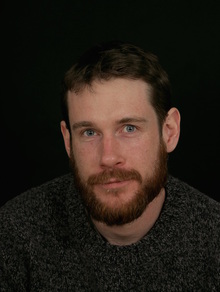@ Ullapool Book Festival, Fri 6 May 2016
Fashionably bearded and slight, Malachy Tallack is the opposite of the brash adventurer stereotype. In fact, he doesn’t even look entirely comfortable on the platform at Ullapool Village Hall (which he shares with chair Ruth Wishart) to talk about his travelogue 60 Degrees North. It’s hard to imagine Tallack as a singer-songwriter, a performer: he speaks thoughtfully, his voice considered and halting. However, his earnestness and self-deprecating vulnerability give him an instant rapport with his audience.
Transplanted as a 9-year-old from the South of England to Shetland, Tallack had an uneasy start there – he felt an outsider, not welcome with his English accent. But he had left behind more than his familiar surroundings: his father had stayed behind, so all memories of a happy, intact family unit were bound up with the place he left behind.
Fast-forward to his 20s, and Tallack found he missed Shetland wherever he was. Place and identity: Tallack’s book explores other places which, like Shetland, lie 60 Degrees North: Alaska, St Petersburg, Greenland. Is there anything these places shared?
Tallack is at his most animated when discussing small, remote communities which are successful because of people’s necessity to rely on one another. For some of the peoples he encountered, the concept that the land could belong to anyone is incomprehensible; just as preposterous as assigning ownership of the air.
The author freely acknowledges that 60 Degrees North is more than just a travelogue – the book is about belonging: his relationship with Shetland, but also his grief for his father. The outer landscape affects and reflects the landscape within. ‘Much writing is inspired by the longing for what is lost’ he muses. ‘Writing is creation. The opposite of loss.’
Wishart might have left it at that instead of persisting with question after question about Tallack’s personal and family circumstances. “I’m quite a private person, really,’ he hints like a gentleman.
The transformation from interviewee to reader is absolute. Tallack is sure-footed and in control when reading aloud, both during a reflective passages and a humorously tense account about a walk in Alaskan wild bear territory. Shame that Wishart insists on delivering the plot-spoiler Tallack has deliberately withheld. But she is astute, too, asking questions of identity and belonging quite befitting Tallack’s reflective prose: How come this Shetland Boy now lives in Glasgow?
‘Maybe distance and perspective was what I needed to finish the book,’ Tallack admits, acknowledging that Glasgow’s anonymity may have been part of the appeal. ‘Nothing in your book suggests you’re a man in search of an easy life,’ counters Wishart. “Are you an irretrievably restless soul?”
Tallack shifts in his seat. ‘Yes’.
The chair may have looked for a longer answer, but Tallack has the audience with this one word.
Interesting, awkward, thought provoking, uncomfortable, intelligent and ultimately uplifting. Malachy Tallack is one to watch out for.
